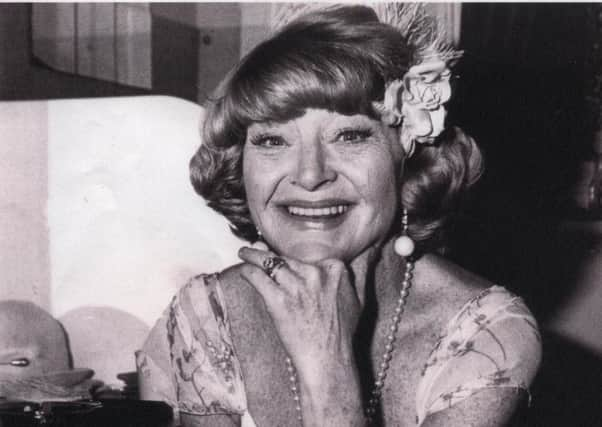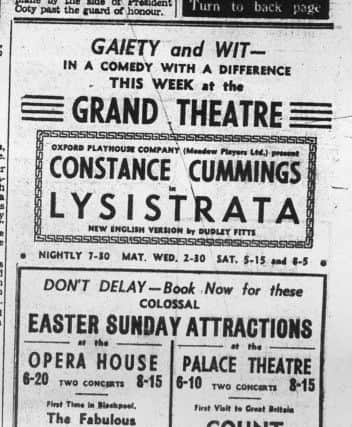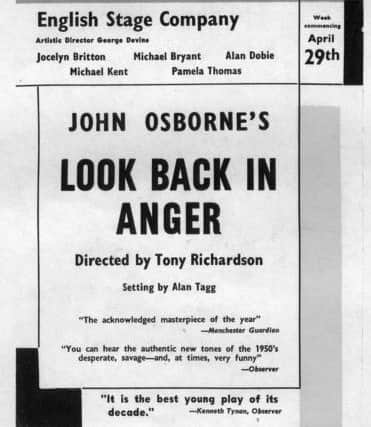From cheeky comedy to the kitchen sink


Following the 25-year rule gives continuity and keeps things tidy.
But for entertainment nostalgia we can dip in wherever there is an interesting anniversary and this week’s piece happens to be from exactly 60 years ago.
Advertisement
Hide AdAdvertisement
Hide AdAs a bonus comes the Gazette ad which must have been the only space ever shared by a play by Aristophones and a concert by the Count Basie Orchestra! At different theatres, of course.


Both shows were talking points, but a Greek sex comedy won on curiosity value. Most people knew nothing about the 2,400-year-old Lysistrata – until the educated few started to whisper.
It did wonders for the box office, which would otherwise have been bare. Wasn’t it ironic (with an ‘r’) this bawdy piece was presented uncensored at the Grand in March, when a month earlier we had seen the last Blackpool performances, at the Queen’s Theatre, of supposed blue comedian Frank Randle, routinely “blue pencilled” by the Lord Chamberlain’s office.
The Gazette’s Brian Hargreaves (later editor) opened his review of the Oxford Playhouse Company’s tour of Lysistrata with: “It is surprising how antiquity and the support of the Arts Council can act as a cloak of respectability. It is doubtful whether a contemporary author would have the cheek to submit for production a phallic comedy like Aristophanes’ Lysistrata.”
Advertisement
Hide AdAdvertisement
Hide AdThe Tuesday night review caused a small crowd to appear at the box office at Wednesday lunchtime!


Brian’s review managed to be erudite as well as chortling. He said if any modern writer had been so bold it surely would have been “ruthlessly gutted by the blue pencil.”
“No one could call this play suggestive – it is unblushingly explicit. But this is a classic, over 2,000 years old. Apparently that makes it decent. It seems it even has the Lord Chamberlain’s nod.
“This production is not for children or the easily shocked. It is a play for the man (or woman) of the world, who should enjoy it greatly. It is difficult to imagine anything more comic than the second act. The plot concerns a strike by the women of Greece. They say to their husbands, in effect, “Lay down your arms and surrender to mine”.
Advertisement
Hide AdAdvertisement
Hide Ad(This was a topical aside by Brian to the lyric of an Anne Shelton chart-topper of 1956).


He continued: “And they make it clear to the husbands unless they treat for peace they must keep out of the marital embrace. Neither men nor women relish this revolt, which results in ribald comedy.
“The spicy humour must be considered in context. The play contains excellent comedy of a more generally accepted kind and its subject is brilliantly presented, and as pointed now as it ever was. An American writer, Dudley Fitts, has translated Aristophanes into crisp modern idiom and Greek folk songs add atmosphere.”
The reviewer thought American actress Constance Cummings was splendidly feline as Lysistrata and Prunella Scales (in the first of two 1957 appearances at the Grand) was “a challenging kitten.”
Advertisement
Hide AdAdvertisement
Hide AdIn dipping in to the Grand’s list of shows that year, we find most of the plays prior to the summer season were comedies. The reason may have been the threat from television. ITV had come on the air in 1956, causing a shortage of touring plays and closure of the Grand for two months in the autumn.


So in 1957, the theatre management set out to “make ‘em laugh” any way possible.
In January they got one of Noel Coward’s last plays, which had come out of a West End run of only 276 performances. South Sea Bubble was a whimsical piece set in one of Britain’s Pacific island colonies.
In February came The Lovebirds, a modern marital comedy starring Ronald Shiner and Dora Bryan. It gained Dora a tribute from reviewer Hargreaves: “One of the most original comic talents in the theatre.”
It went on to 523 performances at London’s Adelphi Theatre.
Advertisement
Hide AdAdvertisement
Hide AdIn March one of three comedies was the controversial Lysistrata. But Grand patrons had little time to calm down, for it was followed by another shock.
“Kitchen sink” drama arrived in the form of John Osborne’s Look Back in Anger. It was toured by the English Stage Company a year after its sensational impact at London’s Royal Court Theatre.


Brian Hargreaves neatly and briefly stated the importance of the first angry young man drama: “It explodes like a depth charge in the stagnant water of post-war British theatre.”
Alan Dobie, who had spent a year at the Bristol Old Vic, got his big break touring in the role of the angry and disillusioned Jimmy Porter, played originally by Kenneth Haigh and in the 1959 screen version by Richard Burton.
Advertisement
Hide AdAdvertisement
Hide Ad“He tackles Porter with great intensity, never losing the character’s pathos while spitting forth vicious, witty invective,” said the reviewer.
Any show that followed Look Back in Anger would have been a contrast, but Free as Air (in May) was also a world away, set in the Channel Islands. It was the second musical of Julian Slade and Dorothy Reynolds, whose Salad Days was on the way to scoring more than 2,000 London performances. The new show was at the Grand prior to opening at London’s Savoy Theatre in June. The principals were Patricia Bredin, Dorothy Reynolds and Michael Aldridge but down the page was Leonard Rossiter, whose pro career had started with Preston Rep three years earlier.